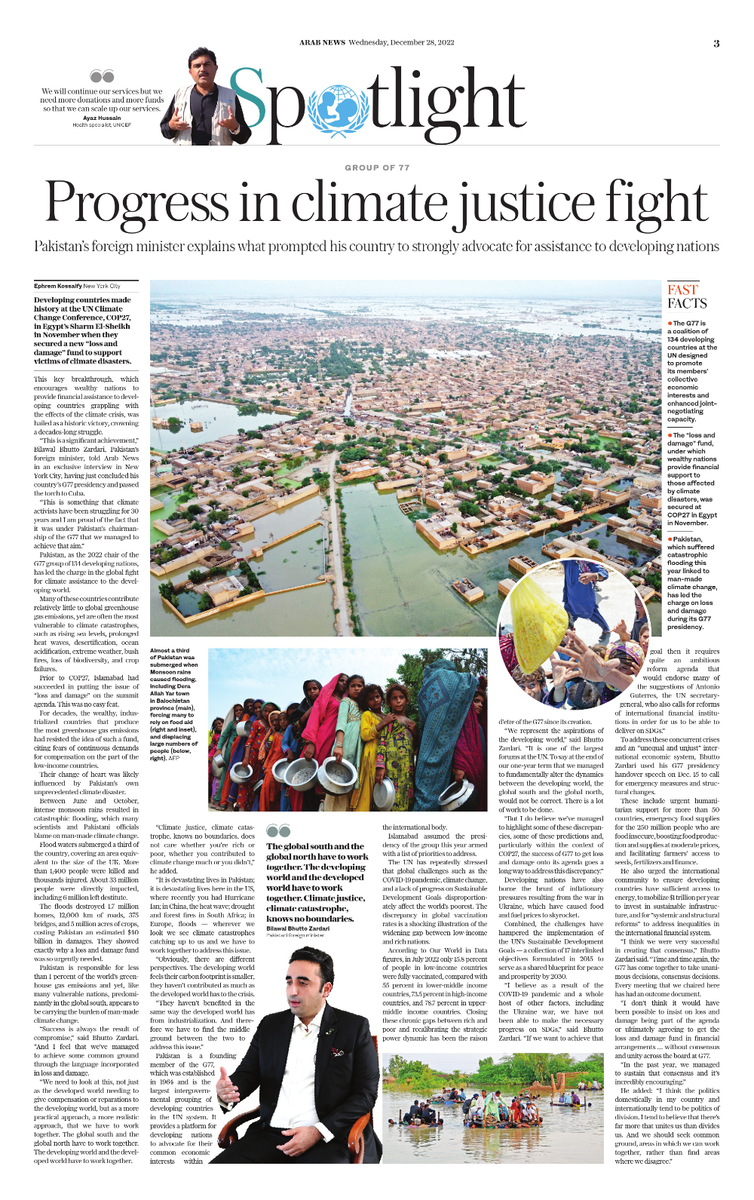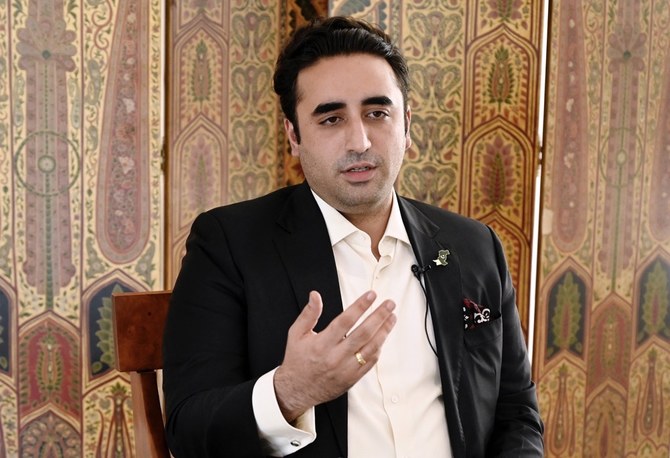NEW YORK CITY: Developing countries made history at the UN Climate Change Conference, COP27, in Egypt’s Sharm El-Sheikh in November when they secured a new “loss and damage” fund to support victims of climate disasters.
This key breakthrough, which encourages wealthy nations to provide financial assistance to developing countries grappling with the climate crisis, was hailed as a historic victory, crowning a decades-long struggle.
“This is a significant achievement,” Bilawal Bhutto Zardari, Pakistan’s foreign minister, told Arab News in an exclusive interview in New York City, having just concluded his country’s G77 presidency and passed the torch to Cuba.
“This is something that climate activists have been struggling for for 30 years and I am proud of the fact that it was under Pakistan’s chairmanship of the G77 that we managed to achieve that aim.”
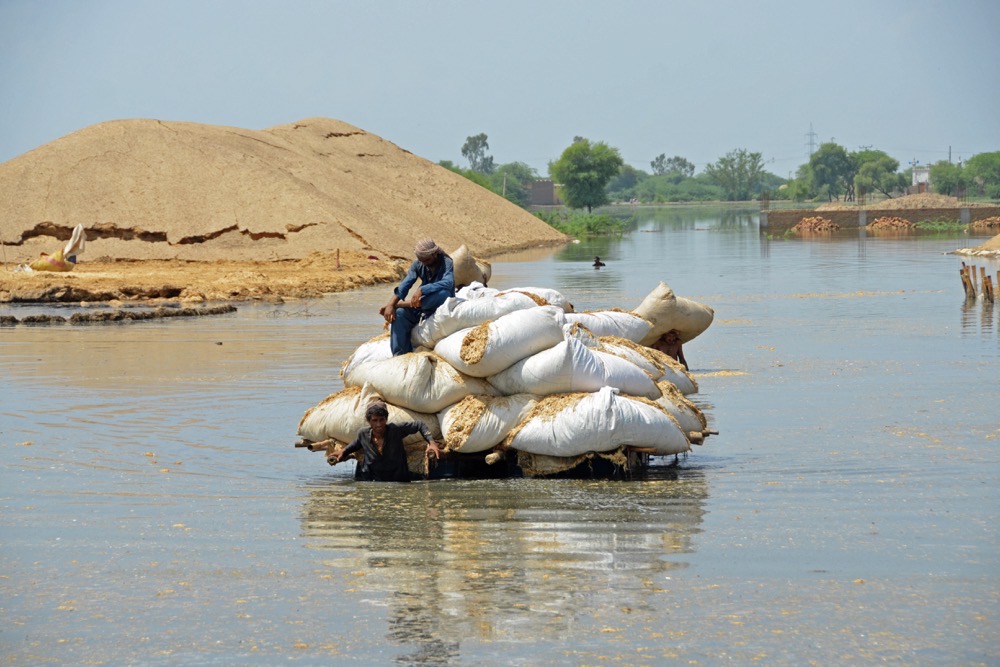
Flood waters submerged one-third of the country, covering an area equivalent to the size of the UK. (AFP)
Pakistan, as the 2022 chair of the G77 group of 134 developing nations, has led the charge in the global fight for climate assistance to the developing world.
Many of these countries contribute relatively little to global greenhouse gas emissions, yet are themselves often the most vulnerable to climate catastrophes, such as rising sea levels, prolonged heat waves, desertification, ocean acidification, extreme weather, bush fires, loss of biodiversity, and crop failures.
Prior to COP27, Islamabad had succeeded in putting the issue of “loss and damage” on the summit agenda. This was no easy feat.
For decades, wealthy, industrialized countries, which produce the most greenhouse gas emissions, resisted the idea of such a fund, citing fears of continuous demands for compensation on the part of the low-income countries.
Their change of heart was likely influenced by Pakistan’s own unprecedented climate disaster.
Between June and October, intense monsoon rains resulted in catastrophic flooding, which many scientists and Pakistani officials believe was the result of man-made climate change.
Flood waters submerged one-third of the country, covering an area equivalent to the size of the UK. More than 1,400 people were killed and thousands more injured. Around 33 million people were directly impacted, including 6 million left destitute.
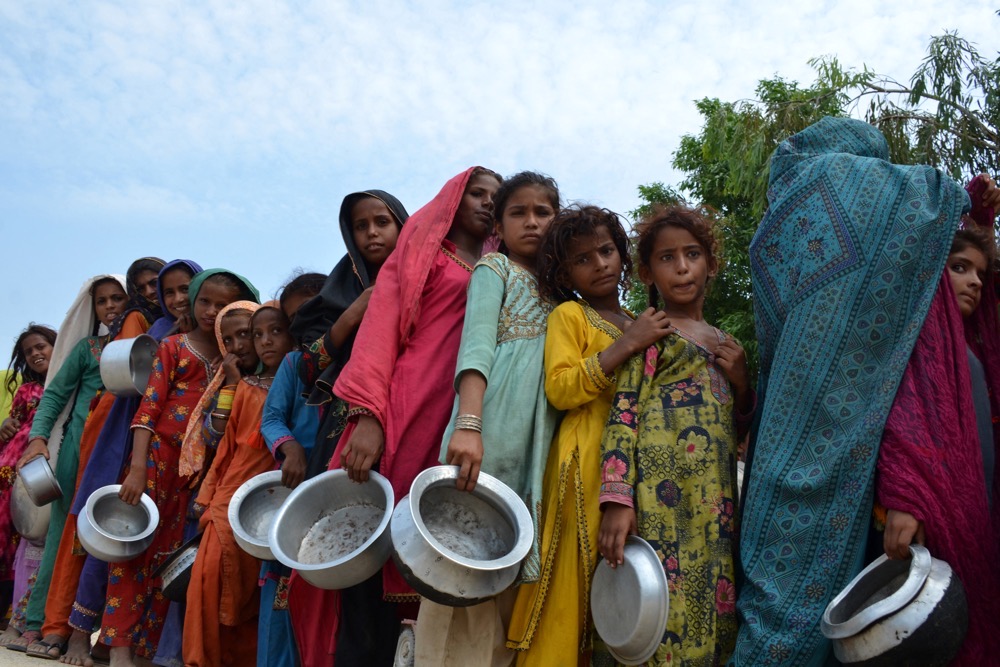
Around 33 million people were directly impacted, including 6 million left destitute. (AFP)
The floods destroyed 1.7 million homes, 12,000 km of road, 375 bridges, and 5 million acres of crops, costing Pakistan an estimated $40 billion in damages, while amply demonstrating why a loss and damage fund was so urgently needed.
Indeed, Pakistan is responsible for less than 1 percent of the world’s greenhouse gas emissions, and yet, like many vulnerable nations, predominantly in the global south, appears to be carrying the burden of man-made climate change.
“Success is always the result of compromise,” Bhutto Zardari told Arab News.
“And I feel that we’ve managed to achieve some common ground through the language incorporated in loss and damage.
FASTFACTS
• The G77 is a coalition of 134 developing countries at the UN designed to promote its members’ collective economic interests and enhanced joint negotiating capacity.
• The “loss and damage” fund, under which wealthy nations provide financial support to those impacted by climate disasters, was secured at COP27 in Egypt in November.
• Pakistan, which suffered catastrophic flooding this year linked to man-made climate change, has led the charge on loss and damage during its G77 presidency.
“We need to look at this, not just as the developed world needing to give compensation or reparations to the developing world, but as a more practical approach, a more realistic approach, that we have to work together.
“The global south and the global north have to work together. The developing world and the developed world have to work together.
“Climate justice, climate catastrophe, knows no boundaries, does not care whether you’re rich or poor, whether you contributed to climate change much or you didn’t.
“It is devastating lives in Pakistan. It is devastating lives here in the US, where recently you had Hurricane Ian. In China, the heat wave. Drought and forest fires in South Africa. In Europe, floods.
“Wherever we look we see climate catastrophes catching up to us and we have to work together to address this issue.
“Obviously, there are different perspectives. The developing world feels that their carbon footprint is smaller, they haven’t contributed as much as the developed world has to the crisis.
“They haven’t benefited in the same way the developed world has from industrialization. And therefore we have to find the middle ground between the two to address this issue.”

“Climate justice, climate catastrophe, knows no boundaries,” said Bilawal Bhutto Zardari, Pakistani Foreign Minister. (AFP)
Pakistan is a founding member of the G77, which was established in 1964 and is the largest intergovernmental grouping of developing countries in the UN system. It provides a platform for developing nations to advocate their common economic interests within the international body.
Islamabad had assumed the presidency of the group — its third tenure since the group was founded — armed with a list of priorities it intended to address.
The UN has repeatedly stressed that global challenges such as the COVID-19 pandemic, the effects of climate change, and a lack of progress on the implementation of the Sustainable Development Goals are disproportionately falling on the shoulders of the world’s poorest.
The discrepancy in vaccination rates around the world alone was a shocking illustration of the widening gap between low-income and rich nations.
According to Our World in Data figures, as of July 2022, just 15.8 percent of people in low-income countries were fully vaccinated, compared with 55 percent in lower-middle income countries, 73.5 percent in high-income countries, and 78.7 percent in upper-middle income countries.
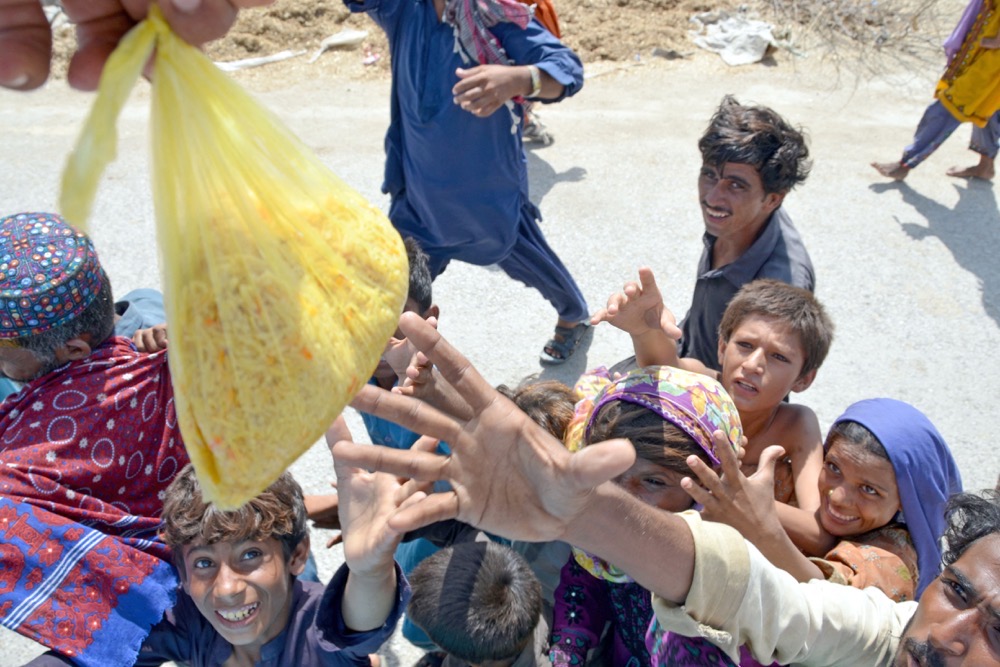
Many have had to rely on food aid to survive. (AFP)
Closing these chronic gaps between rich and poor and recalibrating the strategic power dynamic has been the raison d’etre of the G77 since its creation.
“The agenda, or the aspiration of the G77, is exactly that. We represent the aspirations of the developing world,” said Bhutto Zardari. “It is one of the largest forums at the UN.
“To say at the end of our one-year term that we managed to fundamentally alter the dynamics between the developing world, the global south and the global north, would not be correct. There is a lot of work to be done.
“But I do believe we’ve managed to highlight some of these discrepancies, some of these predictions and particularly within the context of COP27, the success of G77 to get loss and damage onto its agenda goes a long way to address this discrepancy.”
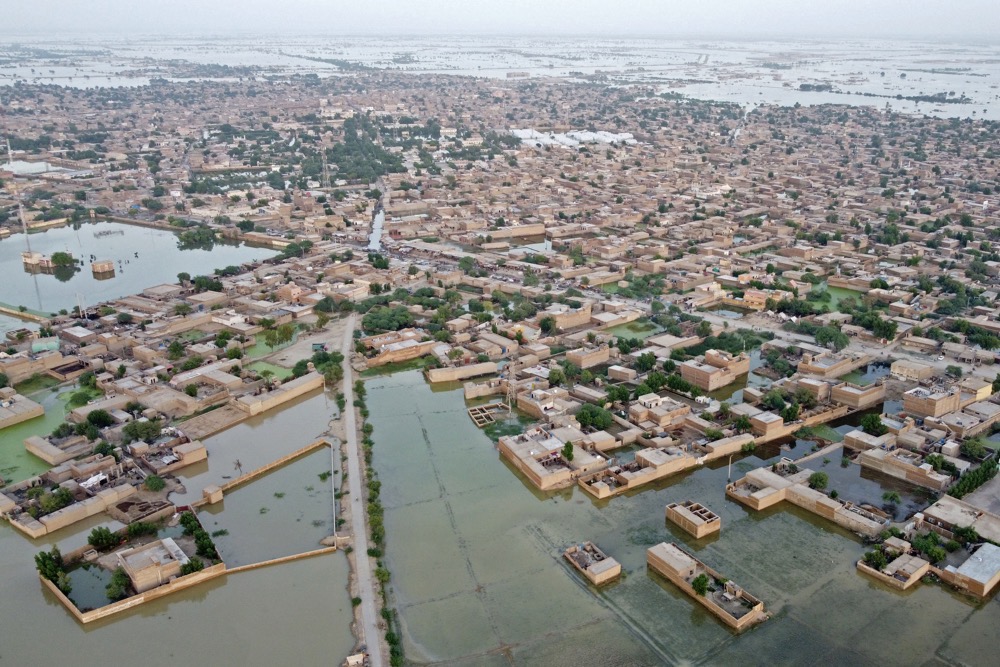
Almost a third of Pakistan was submerged when Monsoon rains caused flooding, including Dera Allah Yar town in Balochistan province. (AFP)
Beyond the climate crisis, the pandemic, and regional conflicts, developing nations have also borne the brunt of inflationary pressures resulting from the war in Ukraine, which have caused food and fuel prices to skyrocket over the course of the past year.
Combined, these challenges have hampered the implementation of the UN Sustainable Development Goals — a collection of 17 interlinked objectives formulated in 2015 to serve as a shared blueprint for peace and prosperity for people and the planet to be achieved by 2030.
“I believe as a result of the COVID-19 pandemic and a whole host of other factors, including the Ukraine war, we have not been able to make the necessary progress on SDGs,” said Bhutto Zardari.
“If we do want to achieve that goal then it requires quite an ambitious reform agenda that would endorse many of the suggestions of Antonio Guterres, the UN secretary-general, who also calls for reforms of international financial institutions in order for us to be able to deliver on SDGs.”
To overcome these concurrent crises, restore economies, achieve the SDGs, and address the “unequal and unjust” international economic system, Bhutto Zardari used his G77 presidency handover speech on Dec. 15 to call for emergency measures and structural changes.
These include mobilizing urgent humanitarian support for more than 50 countries in economic distress, providing emergency food supplies through the UN to the 250 million people who are food insecure, boosting food production and supplies to moderate prices, and facilitating farmers’ access to seeds, fertilizers and finance.
Bhutto Zardari also urged the international community to ensure developing countries had sufficient access to energy, to mobilize $1 trillion per year to invest in sustainable infrastructure, and for “systemic and structural reforms” to address the inequalities of the international financial system.
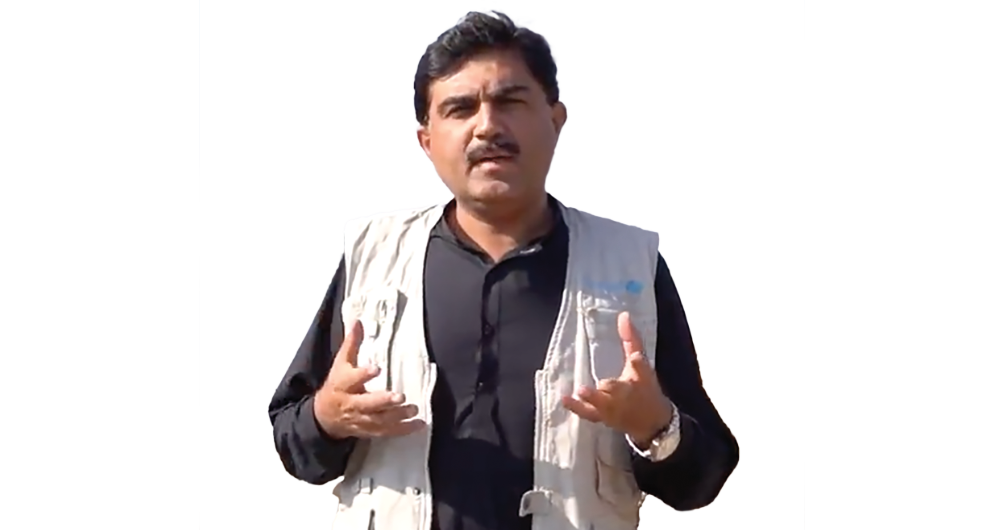
“We will continue our services but we need more donations and more funds so that we can scale up our services,” said Ayaz Hussain, Health specialist, UNICEF. (Supplied)
Loss and damage was a rare point of policy convergence in South Asia and a demonstration of developing nations wielding collective strength when they have common cause. “I think we were very successful in creating that consensus,” Bhutto Zardari told Arab News.
“Time and time again, the G77 has come together to take unanimous decisions, consensus decisions. Every meeting that we chaired here has had an outcome document.
“I don’t think it would have been possible to insist on loss and damage being part of the agenda or ultimately agreeing to get the loss and damage fund in financial arrangements… without consensus and unity across the board at G77.
“In the past year, we managed to sustain that consensus and it’s incredibly encouraging.”
He added: “The art of diplomacy, of politics, is being able to find mutual ground. I am a strong believer. I think the politics domestically in my country and internationally tend to be politics of division.
“I tend to believe that there’s far more that unites us than divides us. And we should seek common ground, areas in which we can work together, rather than find areas where we disagree.”
